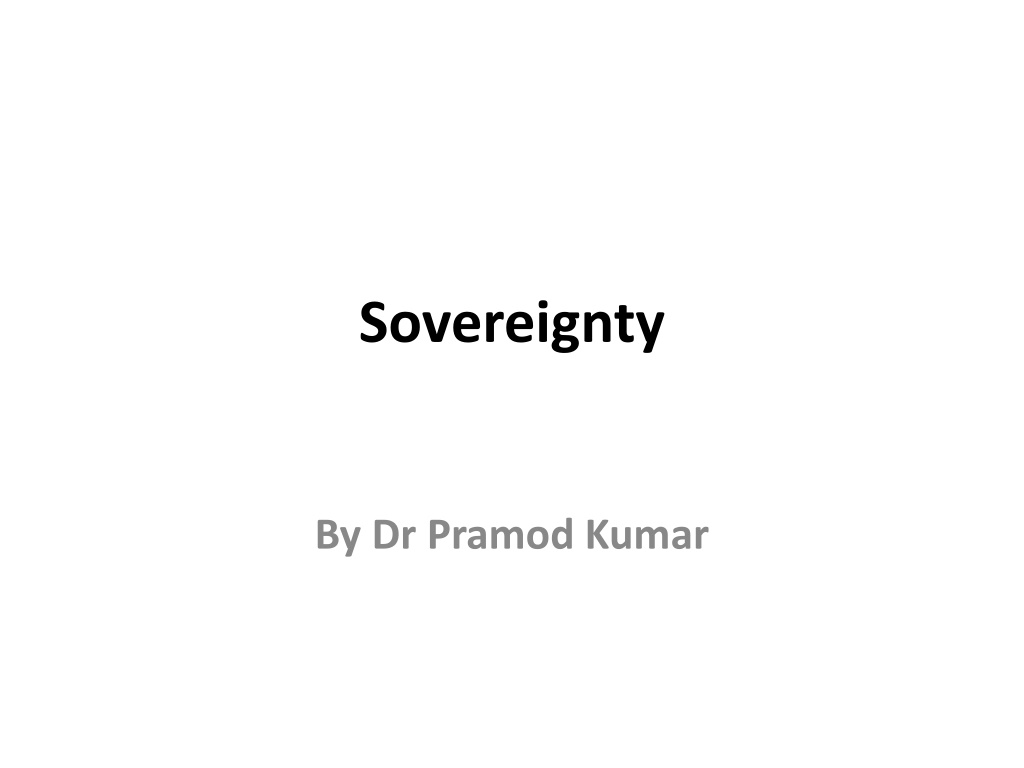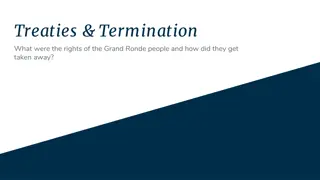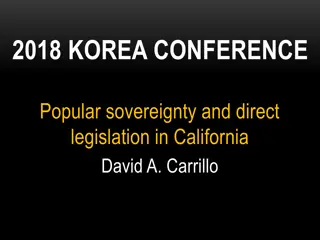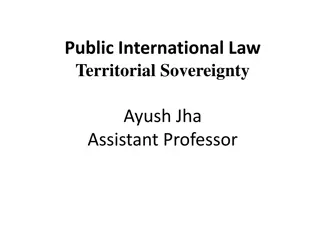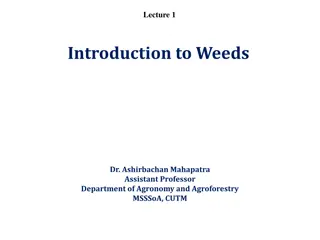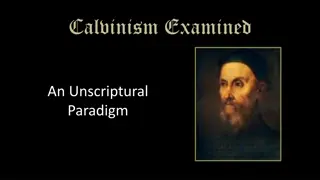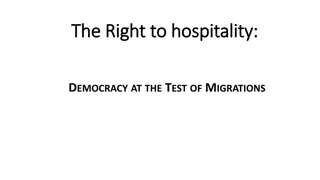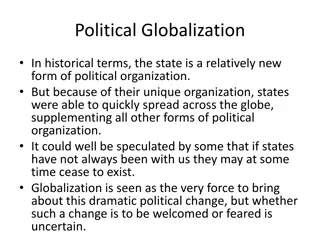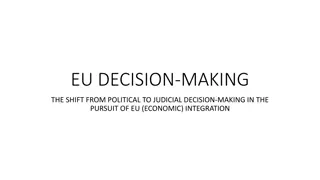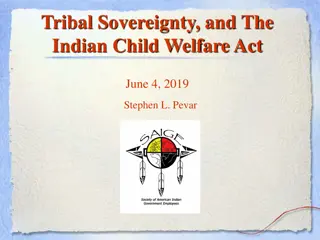Understanding Sovereignty: Origins, Definitions, and Characteristics
The concept of sovereignty traces back to Aristotle, evolving through key figures like Jean Bodin and Hugo Grotius. Defined by supreme power over citizens, sovereignty exhibits permanence and universality in the context of state authority. Explore its roots, meanings, and enduring features in political discourse.
Download Presentation

Please find below an Image/Link to download the presentation.
The content on the website is provided AS IS for your information and personal use only. It may not be sold, licensed, or shared on other websites without obtaining consent from the author. Download presentation by click this link. If you encounter any issues during the download, it is possible that the publisher has removed the file from their server.
E N D
Presentation Transcript
Sovereignty By Dr Pramod Kumar
Origin of the Term Although the term sovereignty is modern, the idea goes back to Aristotle, who spoke of the supreme power of the state. The Roman jurists and the civilians throughout the Middle Ages likewise had the idea, for they frequently employed the terms summa potestas and plenitudo potestatis by which to designate the supreme power of the state. The modern terms sovereign and sovereignty (souverain, souverainete) were first used by the French jurists in the fifteenth century.
Origin of the Term Jean Bodin (1530-1596) in the sixteenth century was the first writer to discus the nature and characteristics of sovereignty in his 6thBook on the Republic. Niccolo Machiaveli Hobbes (1588-1679), John Locke (1632-1704), and Montesquieu (1689-1755) are also key figures in unfolding sovereignty. (1469-1527), Thomas the concept of
Definitions of Sovereignty Jean Bodin:- the supreme power of the state over citizens and subjects, unrestrained by law . Hugo Grotious :- the supreme political power vested in him whose acts are not subject to any other and whose will cannot be overridden .
Definitions of Sovereignty Duguit:- commanding power of the state; it is the will of the nation organized in the state; it is the right to give unconditional orders to all individuals in the territory of the state . Burgess:- characterizes it as original, absolute, ultimate power over the individual subject and all associations of objects. Again he calls it the underived and independent power to obedience . command and compel
Characteristics Permanence: Permanence is the main characteristics of sovereignty. Sovereignty lasts as long as an independent state lasts. The death of the king, the overthrow of the government does not affect sovereignty. It rests with the state as long as the State is independent. State & sovereignty can not be separated from each other. It is permanent in that it exists as long as the state exists. The ruler can be died but the state is permanent
Characteristics Universality: The state is all comprehensive and the sovereign power is universally applicable. No association or group of individuals, however rich or powerful it may be, can resist or disobey the sovereign authority. Every individual and individual is subject to the sovereignty of the state. Sovereignty makes no exception and grants no exemption to anyone. every association of
It is all comprehensive & universal. The state authority extends to all persons, things , groups & association within its territory without any exception. It is a master & others are its subordinates. No one has either authority, or the capacity to challenge its power.
Characteristics Exclusiveness: By exclusiveness is meant that there can not be two sovereigns in one independent state. If two sovereigns exist in a state, the unity of that state will be destroyed. There can not exist another sovereign state within the existing sovereign state. Inalienability: Sovereignty is the life and soul of the state and it can not be alienated without destroying the state itself.
It means that sovereignty can not be transferred to any one other body without destroying. It can not be separated from itself. Alienation of sovereignty by a state would mean destruction of the state itself- No sovereignty, no state . If a sovereign resigns, it does not imply alienation of sovereignty . It amounts to merely a change in the form of government. The government is only an agency to execute the will of the sovereignty.
Characteristics Indivisibility: Sovereignty can not be divided into parts. The exercise of its powers may be distributed among various governmental organs, but sovereignty is a unit, just as the state is a unit. Sovereignty is entire thing to divide it, is to destroy because it represents supreme will of the state. Once it is divided , it no more remains a will. There can not be two sovereign in a state.
Characteristics Unity: Unity is very spirit of sovereignty. The sovereign state is united just as we are united. Absoluteness: Sovereignty is absolute and unlimited. There can be no legal power within the state superior to it, and there can be no legal limit to the supreme law making power of the state. Sovereignty can not be limited or restricted by any superior power within the State or outside the State. The sovereign is neither dependent nor accountable to anyone. Within the state , the will of the sovereign is supreme.
Characteristics It can make laws, amend or repeal them. it can amend the constitution. It can use coercion for the execution of laws within its territory. There is no outside authority to pressure on State. It is not bound any international treaties, even if, it has been a party to them. Originality: By originality we mean that the sovereign wields power by virtue of his own right and not by virtue of anybody s mercy.
Kinds of Sovereignty Internal sovereignty: Sovereignty is normally understood as possessing two distinct aspects: internal and external. Sovereignty within the national sphere is known as internal sovereignty. A state which possesses internal sovereignty is one which has the authority and ability to exercise command over its society. In this situation there are no alternative sites of authority within the nation.
Kinds of Sovereignty External sovereignty: External sovereignty concerns the relationship between a sovereign power and other states. The term external sovereignty is employed by some writers to mean nothing more than the freedom of the state from subjugation to or control by a foreign state. That is supremacy of the state as against all foreign wills, whether of persons or state.
Kinds of Sovereignty Nominal & Real Sovereignty: In ancient times many states had monarchies and their rulers were monarchs. They wielded absolute power and their senates were quite powerless. At that time they exercised real sovereignty and regarded as real sovereign. For example, Kings were sovereigns and hence were all powerful in England before fifteenth century, in USSR before the eighteenth an nineteenth centuries and in France before 1789.
Kinds of Sovereignty Titular(Nominal ) & Actual (Real) Sovereignty:- Titular sovereignty implies sovereignty in the title or by designation. A titular Sovereign is supreme only in name. Ex: The king of England, Indian President , their powers are exercised by the Prime Minister & the cabinet. Actual sovereignty means real executive which possess real power of state. Ex: P.M of India, U.K & President of U.S.A
Kinds of Sovereignty Legal Sovereignty: Legal sovereignty is the supreme law-making authority. The legal sovereign, determinate authority which is able to express in legal form the highest commands of the state. For instance, the parliament is the legal authority to exercise legal sovereignty. Only its commends are laws. It is recognized by law. It reside in one person or body of persons. therefore, is that
Kinds of Sovereignty Political Sovereignty: It is vested in the body of citizens who have a right to vote. it is supreme in democracy. Its will is expressed through election & public opinion. It influences the decision, policies & laws made by the legal sovereign. The legal sovereign has to act according to the will of the electorate. Electorate is a political sovereign. the electorate constitutes the political sovereign, yet in a wider sense
It means the power of the masses as contrasted with the power of the individual ruler of the class. It implies manhood, suffrage with each individual having only one vote and the control of the legislature by the representatives of the people. In popular/ political regarded as supreme. In the ancient times many writers on Political Science used popular sovereignty as a weapon to refuse absolutism of the monarchs. sovereignty public is
Kinds of Sovereignty De jure Sovereignty De jure sovereignty is the legal sovereignty and it has foundation in law. Its attribute is the right to govern and command obedience. It is source of law & has a legitimate claim to the obedience of its subjects. It is a legal sovereign. it has legal right on its side and is lawfully entitled to command and exact obedience.
Kinds of Sovereignty De facto Sovereignty It is the actual sovereign a sovereign which is actually obeyed by the people. It is purely based on physical force or religious influence. De facto (or actual) sovereignty is the sovereignty which is actually able to make its will prevail, though it may be without legal basis. That person or body of persons who actually exercises power, and who, for the time being, is able to enforce obedience, or to whose commands voluntary obedience is given by the bulk of the people, is called the de facto sovereign. The criterion of sovereignty is actual obedience to commands.
